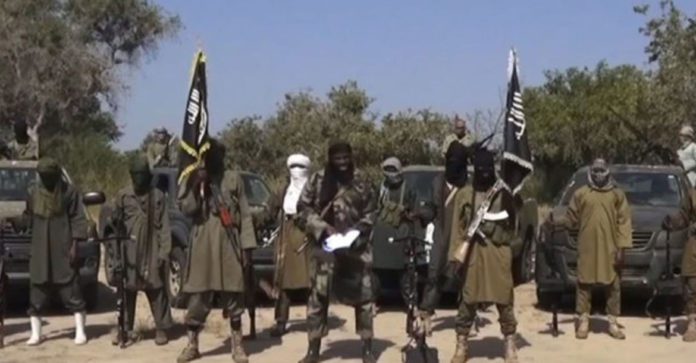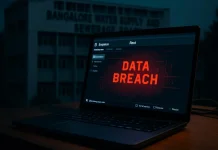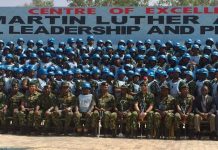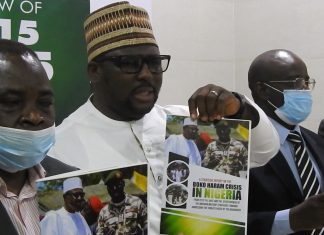By Emmanuel Onwubiko
There are two different issues that have just cropped up in the public domain and have constituted the discussion points for most commentators observing the trajectories of the Counter terror war being waged by the Armed forces of the Federal Republic of Nigeria. I must say that everyone who is somebody in the World of scholarship is involved in the observation of the goings on in the war on terror in the North East of Nigeria.
These two issues are the just announced national training exercises by the Nigerian Army to cover all parts of Nigeria and secondly but not the least is the talking point on the statement credited to the Nigeria’s Army Chief Lieutenant General Tukur Yusuf Buratai that combats are not enough to overcome the terror threats in Nigeria but that there is the essential element of the spiritual dimension or what I have chosen to call the ‘Spiritual warfare’.
Beginning from the angle of the arguments and debates that are beginning to dominate the social media space which is the issue of the need for a Spiritual dimension to the fight on terror, I will state categorically that the statement by the Army Chief has been misinterpreted and misunderstood by some of these prominent commentators and agenda setters who have unleashed a wave of criticisms condemning the statement and painting a graphic picture of a military chief who no longer has any winning strategy to combat once and for a the terrible but formidable threats that armed boko Haram terrorists pose to the corporate existence of Nigeria.
This misinterpretation could have been avoided if those making the remarks had taking their time to read through the published speech made by the Army Chief and if these observers have found the intellectual presence of mind to just conduct just three hours research on the thematic area of what in the West is termed Islamic terrorism.
Before I delve into citations of authorities to show that what the Army Chief of Staff said is the correct statement of facts all over the contemporary World, I will state straightaway that there can be no terrorism without distorted religious and ideological belief system spread by some radicalized elements found in almost all religious groups and nationalities.
So, I admit that terrorism is not an exclusive preserve of bad MOSLEMS but even White Supremacists who have on many occasions engaged in mass shootings in New Zealand, USA and Australia are not MOSLEMS.
The best way forward as a strategy for winning the hearts and minds of the people of the territorial space whereby the war on terror is waged, is to accept the reality that it will take intensive Spiritual and theological reorientation by the real and genuine scholars of Islam for instance who should normally be expected and requested to play significant roles to change the wrong mindset of the younger elements who are rapidly been radicalized and wrongly indoctrinated by the hierarchy of the boko Haram terrorists.
I will return to this point and back it up with contemporary but profound research findings. Terrorism is a very developing specialty with trailer load of scholarly works developed or about to be fully developed. By the last count, I have read about two dozen newly published academic findings on the different dimensions of the global war on terror which intensified since September 11th 2001 when the World saw the coordinated attacks by the Islamic terrorists group al-Qaeda against the United States of America on the morning of Tuesday September 11th 2001 which snowballed into a global incident since out of the well over 3,000 casualties, virtually every continent of the World lost their members.
But first let me remind these critics who I must admit mean well for Nigeria that the Chief of Army Staff did not call for the abdication of combats by the professional soldiers neither did he advocate that the soldiers who are fighting in the war fronts or flashpoints of war on terror should abandon their professional callings to embrace spiritual exercises in Churches and Mosques. Far from it.
Rather, the Chief of Army Staff, Lt General Tukur Yusuf Buratai, said that terrorism and terrorist groups could not be eliminated alone by the military unless religious bodies and organizations in the country come to the “forefront of this spiritual battle.”
The army chief noted that the focus must be religious groups interfacing on addressing the ideologies which fuelled the Boko Haram and ISWAP terrorists.
Buratai stated these on Monday in Abuja at a spiritual warfare seminar at the Nigerian Army Resource Centre with the theme, “countering insurgency and violent extremism in Nigeria through spiritual warfare.”
The army chief, who was represented by the Chief of Administration, Maj Gen Sani Yusuf, therefore, urges Islamic and Christian clerics across the army formations to join the fight against terrorism, and reorient the people against negative ideologies.
Buratai said, “It is easier to defeat Boko Haram and ISWAP terrorists than their ideology because while we degrade the terrorists and their havens, the narrative of the ideology grows the group.
“Therefore, communities, families, and groups should join in the fight and narratives to reject and prevent the ideologies of the terrorists and extremist groups.
“Religious bodies and organizations in particular who interfaces regularly with the grassroots should be at the forefront of this spiritual battle and fashion out ways of stepping up their roles.
“The fight against terrorism, Boko Haram and ISWAP, as well as other security threats, cannot be left to the troops in the battlefield alone. Yes, we will do our duties but the need to tackle groups through spiritual warfare and re-orientating the followers against the ideology is also a necessity.
“It is a well-known fact that terrorism and terrorist groups cannot be totally eliminated by mainly military actions. This means focusing our efforts on the underlying narratives through ideologies that are employed by these terrorists to lure innocent citizens to their fold.
“The need to defeat the ideologies of Boko Haram and ISWAP is based on the awareness that it is the ideologies that enhance their resources and help to recruit new fighters to their fold and as such; kill their ideology and the terrorist movement withers.
The army chief added that religious leaders and clerics who regularly interfaced with members of the society must “fashion out ways of stepping up your roles, remembering that the fight against terrorism is a collective responsibility.”
At the risk of violating the seeming oath of secrecy sworn to when I enlisted as a member of a 7 man Presidential Committee on restoration of Peace and Dialogue in Northern Nigeria which sat for nearly three years prior to the emergence of the current administration, I will tell my readers that top Islamic clerics were part of that committee and their specific roles was to deploy their intellectual wherewithal and their iconic Islamic trainings to re-orientate members of boko haram terrorists whom we met in different undisclosed detention facilities all across Nigeria with the aim of deradicalizing them and reintegrating them through methodical reorientation to once more embrace constructive coexistence with divergent groups of people in the larger communities.
So Lieutenant General Tukur Yusuf Buratai was much more than 100% correct to affirm that the war on terror can’t be conclusively and decisively won through physical means without activating the spiritual mechanisms and dimension.
Now let me quote the experts to back up my affirmations aforementioned.
In the scholarly article titled “Towards a definition of terrorist ideology by Gary A. Ackerman and Michael Burnham these versatile scholars and intellectuals reached a determination that to defeat terrorism you need to have a total appreciation of the underlying spiritual ideology governing these whole ranges of armed terrorists.
They wrote thus: “While conventional wisdom holds that the ideology espoused by a terrorist organization is somehow related to that organization’s actions, the precise nature of the relationship between these phenomena is hotly debated, with scholarship often yielding contrasting empirical results.”
Reminding us that we argue that one reason for this divergence in viewpoints and research findings is an inadequate understanding of what ideology actually is and how it relates to terrorism, but restated their deep conviction that it is the case as it were.
Indeed, these authors revealed that terrorism literature reveals widely disparate uses of the concept of terrorist ideology.
In this aforementioned article the writers endeavor to provide a common framework for approaching ideology in the context of terrorism studies by systematically building a new definition of terrorist ideology from first principles.
In so doing, they introduce a definition of terrorist ideology that is logically consistent, has robust theoretical underpinnings, and connects the study of ideology within terrorism to broader disciplinary research traditions regarding ideology.
This style they stated provides a conceptual foundation from which to examine terrorist ideology in an objective, systematic manner and thereby enables terrorism researchers to more productively investigate important outstanding questions, such as which aspects of an ideology are most relevant to violent behavior.
Another study on the online caliphate: internet usage and ISIS support in Arab World, James A. Piaza and Ahmet Guler who are experts argued that the internet has provided expanded opportunities for violent extremist groups to propagandize and recruit.
“The Islamic State of Iraq and Syria, or ISIS, is an exemplar in that it has heavily invested in an online presence and uses online communities and social media to attract and retain supporters. Does ISIS’s online presence translate into a higher probability that individuals in its target audience will become supporters? In this study we analyze over 6,000 individuals in six Arab countries to find if those that use the internet to follow political news or to express political views are more likely to support ISIS”.
The researchers states that: “We find that respondents who get their news online are significantly more likely to support ISIS than those who follow the news on television or print media. Moreover, those who use online for a political expression are also more likely to express support for ISIS.”
Indeed, they reasoned that individuals who engage in online political discussion are more likely to support ISIS than those who engage in conventional political activity, though less than those who engage in contentious political behaviors such as attending a political protest. We conclude with a brief discussion of the academic and policy implications of these findings.
On the fears that the forthcoming national combat exercises by the Nigerian Army will infringe on human rights if one of the components is to restrict freedom of movements enshrined in the Constitution by way of demanding identification, I need to say that ad a human rights campaigner with deep interests in the internal security operations in the Country, we have received assurances that citizen’s human rights will not be wantonly violated since the Nigerian Army as a constitutionally created agency must comply with chapter 4 of the Nigerian Constitution and as I write the Chief of Army Staff Lieutenant General Tukur Yusuf Buratai has written and distributed a GREEN BOOK containing law based guidelines on protection of human rights of all citizens by the military during combat and non-combat internal operations. I have a copy of this book and I must state that the contents are so rich that Nigerians need not worry that the military will harass intimidate or abuse their human rights with reckless abandon. Moreover, accredited human rights groups will be on ground to observe the operations just as the Nigerian Army has a functional full-fledged department of civil and military relations with vibrant human rights desks in all segments of the Army presence nationwide.
Emmanuel Onwubiko heads Human Rights Writers Association of Nigeria (HURIWA)
Get every Post-UTM, Admission, List, JAMB, WAEC, NECO, and Schools Resumption Date, Breaking News on your WhatsApp Status Now - To join, click the links below.
Join Television Nigerian Whatsapp Now
Join Television Nigerian Facebook Now
Join Television Nigerian Twitter Now
Join Television Nigerian YouTUbe Now
Join Television Nigerian Whatsapp Now
Join Television Nigerian Facebook Now
Join Television Nigerian Twitter Now
Join Television Nigerian YouTUbe Now





